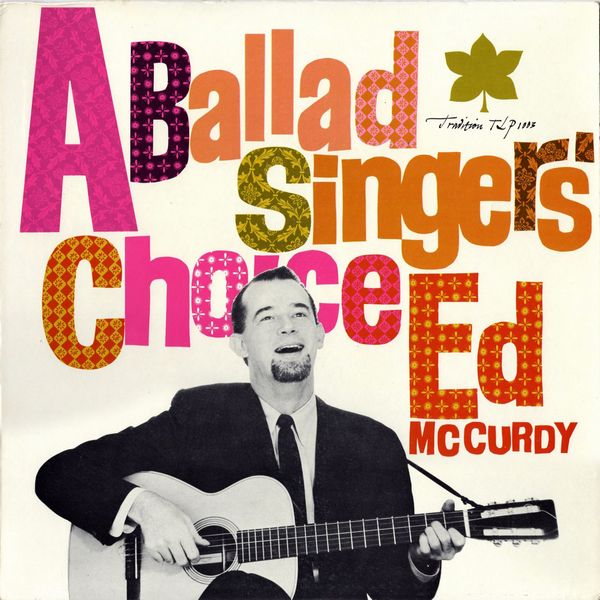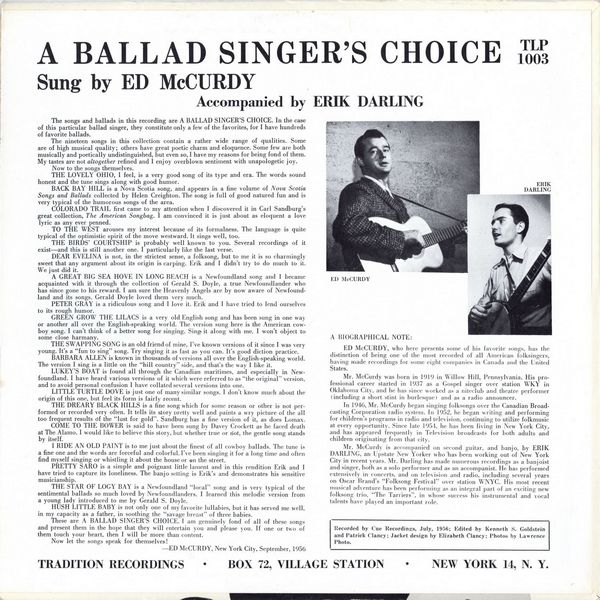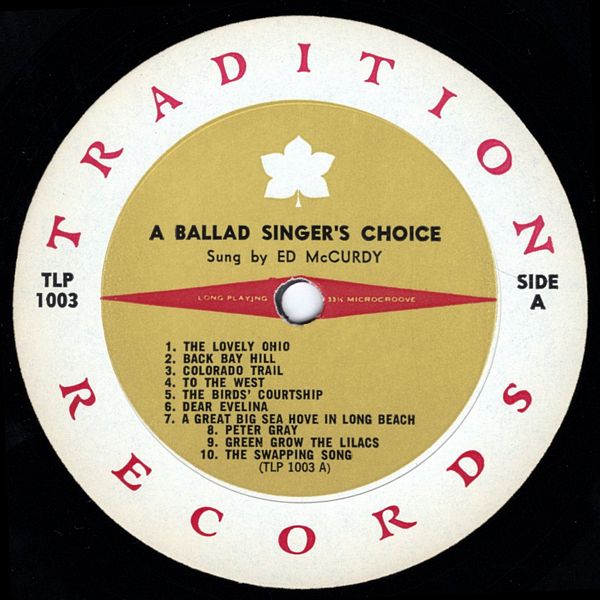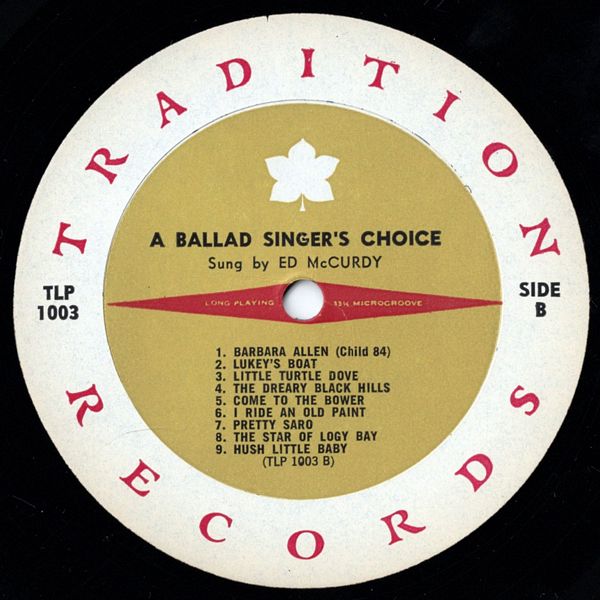

 |



|
Sleeve Notes
The songs and ballads in this recording are A BALLAD SINGER'S CHOICE. In the case of this particular ballad singer, they constitute only a few of the favorites, for I have hundreds of favorite ballads.
The nineteen songs in this collection contain a rather wide range of qualities. Some are of high musical quality; others have great poetic charm and eloquence. Some few are both musically and poetically undistinguished, but even so, I have my reasons for being fond of them. My tastes are not altogether reined and I enjoy overblown sentiment with unapologetic joy.
Now to the songs themselves. THE LOVELY OHIO, I feel, is a very good song of its type and era. The words sound honest and the tune sings along with good humor.
BACK BAY HILL is a Nova Scotia song, and appears in a fine volume of Nova Scotia Songs and Ballads collected by Helen Creighton. The song is full of good natured fun and is very typical of the humorous songs of the area.
COLORADO TRAIL first came to my attention when I discovered it in Carl Sandburg's great collection, The American Songbag. I am convinced it is just about as eloquent a love lyric as any ever penned.
TO THE WEST arouses my interest because of its formalness. The language is quite typical of the optimistic spirit of the move westward. It sings well, too.
THE BIRDS' COURTSHIP is probably well known to you. Several recordings of it exist — and this is still another one. I particularly like the last verse.
DEAR EVELINA is not, in the strictest sense, a folksong, but to me it is so charmingly sweet that any argument about its origin is carping. Erik and I didn't try to do much to it. We just did it.
A GREAT BIG SEA HOVE IN LONG BEACH is a Newfoundland song and I became acquainted with it through the collection of Gerald S. Doyle, a true Newfoundlander who has since gone to his reward. I am sure the Heavenly Angels are by now aware of Newfoundland and its songs. Gerald Doyle loved them very much.
PETER GRAY is a ridiculous song and I love it. Erik and I have tried to lend ourselves to its rough humor.
GREEN GROW THE LILACS is a very old English song and has been sung in one way or another all over the English-speaking world. The version sung here is the American cowboy song. I can't think of a better song for singing. Sing it along with me. I won't object to some close harmony.
THE SWAPPING SONG is an old friend of mine, I've known versions of it since I was very young. It's a "fun to sing" song. Try singing it as fast as you can. It's good diction practice.
BARBARA ALLEN is known in thousands of versions all over the English-speaking world. The version I sing is a little on the "hill country" side and that's the way I like it.
LUKEY'S BOAT is found all through the Canadian Maritimes, and especially in Newfoundland. I have heard various versions of it which were referred to as "the original" version, and to avoid personal confusion I have collated several versions into one.
LITTLE TURTLE DOVE is just one of many similar songs. I don't know much about the origin of this one, but feel its form is fairly recent.
THE DREARY BLACK HILLS is a one song which for some reason or other is not per formed or recorded very often. It tells its story pretty well and paints a wry picture of the all too frequent results of the "lust for gold". Sandburg has a fine version of it, as does Lomax.
COME TO THE BOWER is said to have been sung by Davey Crockett as he faced death at The Alamo. I would like to believe this story, but whether true or not, the gentle song stands by itself.
I RIDE AN OLD PAINT is to me just about the finest of all cowboy ballads. The tune a fine one and the words are forceful and colorful. I've been singing it for a long time and often find myself singing or whistling it about the house or on the street.
PRETTY SARO is a simple and poignant little lament and in this rendition Erik and I have tried to capture its loneliness. The banjo setting is Erik's and demonstrates his sensitive musicianship.
THE STAR OF LOGY BAY is a Newfoundland "local" song and is every typical of the sentimental ballads so much loved by Newfoundlanders. I learned this melodic version from a young lady introduced to me by Gerald S. Doyle.
HUSH LITTLE BABY is not only one of my favorite lullabies, but it has served me well, in my capacity as a father, in soothing the "savage breast" of three babies.
These are A BALLAD SINGER'S CHOICE. I am genuinely fond of all of these songs and present them in the hope that they will entertain you and please you. If one or two of them touch your heart, then I will be more than content. Now let the songs speak for themselves!
Ed McCurdy
New York City, September, 1956
A BIOGRAPHICAL NOTE:
ED MCCURDY, who here presents solve of his favorite songs, has the distinction of being one of the most recorded of all American folksingers, having made recordings for some eight companies in Canada and the United States.
Mr. McCurdy was born in 1919 in willow Hill, Pennsylvania. His professional career started in 1 937 as a Gospel singer over station SVKY in Oklahoma City, and he has since of worked as a niteclub and theatre performer (including a short stint in burlesque) and as a radio announcer.
In 1946, Mr. McCurdy began singing folksongs over the Canadian Broad casting Corporation radio system. In 1 952, he began writing and performing for children's program's in radio and television, continuing to utilize folkmusic at every opportunity. Since late 1954, he has been living in New York City, and has appeared frequently in Televisions broadcasts for both adults and children originating from that city.
Mr. McCurdy is accompanied on second guitar, and banjo, by ERIK DARLING, an Upstate New Yorker who has been working out of New York City in recent years. Mr. Darling has made numerous recordings as a banjoist and singer, both as a solo performer and as an accompanist. He has performed extensively in concerts, and on television and radio, including several years on Oscar Brand's "Folksong Festival" over station WNYC. His most recent musical adventure has been performing as all integral part of an exciting new folksong trio, "The Tarriers", in whose success his instrumental and vocal talents have played an important role.